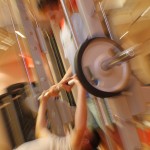 Congratulations on your New Years Resolution to exercise and get fit! Following some simple guidelines in the gym will maximize your fitness gains and reduce risk of injury.
Congratulations on your New Years Resolution to exercise and get fit! Following some simple guidelines in the gym will maximize your fitness gains and reduce risk of injury.
Here are 4 common workout mistakes new exercisers make at the gym:
Overtraining: The gym is always full of new exercisers in January. They are wearing all their bright and shiny fitness gear, ready to tackle their New Years Resolutions. They hit the ground running, literally! These can be sedentary people just starting out, or seasoned exercisers who don’t listen to the messages their bodies are sending. These folks push themselves so hard to try to make fast gains, the next day they can hardly walk down stairs or get out of a chair without muscle soreness and then they hit the gym again. Starting a program too intense and never letting your body rest can lead to numerous injuries. Muscle soreness can result from high volumes of stress to the muscle. Stressing the muscle further in this state can slow the process of growth. The remedy for this is to listen to your body! If you work hard on squats and lunges, work your upper body the next day. After a long hard run, try yoga or swimming the following day. This allows the muscle fibers the rest and growth they need to perform better. Although consistency is important, most proper, safe training plans allow for rest days. These are well deserved breaks to help grow muscle. Listen to your body!
Same routines: One huge mistake I have observed in the gym is doing the same routine day after day. I often see runners on the treadmill logging miles while they never venture into the free weight area. I see the muscle bound weight lifters pumping iron and never leaving the weight room. Your body gets accustomed to the same exercise routine and will become more efficient. This efficiency can lead to plateaus in weight loss and slow your fitness gains and can lead to repetitive use injuries. Change up your program! Try a new activity that will recruit different muscle fibers and build strength and endurance in new and different ways. Consult a trainer to teach you how to use other pieces of equipment you may not be familiar with. Make sure your fitness program has a strength, endurance and stretching component that is varied regularly.
Poor Form and Posture: Form and Posture are critical for proper performance. I frequently see gym goers lifting weights with rounded backs and protracted shoulders and moving so quickly that accessory muscles kick in causing improper muscle substitutions. Many injuries can result from this technique including back pain and shoulder tendinitis. This is not unique to the weight room, I have observed people in a forward bent posture leaning over the elliptical and resting on treadmill handles as if they will slide off the end if they let go. Proper pelvic neutral posture is the solution for all these scenarios. Gently cue your abdominal muscles by drawing your belly button in toward your spine. Keep shoulders aligned with ear lobes, do not let shoulders roll forward. Try all new activities slowly, with light weights and progress the weight when you have correct form. Check your posture frequently in the mirrors. The mirrors are actually there for that reason. Your posture on your last repetition should be as good as your first.
Machines, machines, machines: Most often weight machines isolate specific muscle groups . Muscles in our bodies rarely work in isolation. Most weight machines do not simulate real life and often put the exerciser in a non functional seated position that does not fully engage the core. Our bodies benefit more from functional training. This means training in positions that occur in daily activities such as pushing, pulling, squatting and lifting with core activation. For example, standing in a pelvic neutral position while performing a free weight bicep curl also works your core. To singe even more calories, do the same bicep curl standing on the bosu ball, which challenges balance and gets leg muscles activated. Doing standing squats and lunges with medicine balls or free weights works many muscle groups of the upper, lower body and core simultaneously. Incorporating weighted pulley systems, physioballs, and medicine balls challenge core and balance, while strengthening multiple muscle groups which torches many more calories than isolated weight machine moves.
Julie Mulcahy M.P.T is a licensed Physical Therapist with over 19 years experience in sports medicine and orthopedics. Julie is also busy mom of 4 children and a marathon runner. She may be reached by email, jam82296@hotmail.com or via Twitter @PTrunningmomof4
 Subscribe
Subscribe